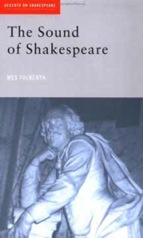Wes Folkerth

Shakespeare’s fools, clowns, changelings and the cultures of early modern intellectual disability; Shakespeare’s critical, social, theatrical and cinematic history; sound in literature; early modern literature and popular culture; history and poetics of pop music; neurodiversity in literature and in the university.
My current research focuses on disability, especially intellectual disability, in literature, and especially in Shakespeare. California transplant. Hoosier by birth. Stories matter: you find them everywhere and they are way more powerful than you thought. Randomness: in 2016 I was session guitarist on a gospel album produced by Celine Dion’s drummer.
My current research combines Disability Studies and Shakespeare Studies — specifically, representations of neurodiversity and intellectual disability on the early modern stage, with a focus on natural and artificial fools, changelings, rustics and clowns, the insane, and melancholic.
M.A., Ph.D. (McGill)
B.A. (Cal State University, Chico)
Books
The Sound of Shakespeare (Routledge, 2002) — reviewed by Tanya Pollard in Shakespeare Newsletter 53 (2003-4); by Helen Moore in the TLS (15 August 2003); by Barbara Hodgdon in Studies in English Literature 43.2 (Spring 2003); by Ralph Berry in Contemporary Review 282 (2003); by Bruce R. Smith in Shakespeare Quarterly 54 (2003); by Matthew Steggle in Renaissance Forum 6.2 (2003); and by Sabine Schülting in Shakespeare Jahrbuch 140 (2004).

Edited Volumes
Co-editor with Leslie Dunn of “Shakespearean Hearing,” Special Issue of The Upstart Crow: A Shakespeare Journal. (29): 2010.
Articles and Book Chapters
"Reading Shakespeare After Neurodiversity," in Performing Disability in Early Modern England, ed. Leslie Dunn. Palgrave/MacMillan, 2020: 141-57.
“Shakespeare and Audio Recording.” The Cambridge Guide to the Worlds of Shakespeare. Vol. 2 – The World’s Shakespeare, 1660-Present. Ed. Bruce R. Smith. Cambridge: Cambridge UP, 2016. 1926-30.
“Goodfellows: Hockey, Shakespeare, and Indigenous Spirits in Tomson Highway’s Dry Lips Oughta Move to Kapuskasing.” In Canadian Shakespeare, ed. Susan Knutson. Toronto: Playwright’s Canada Press, 2010. 199-206.
“Pietro Aretino, Thomas Nashe, and Early Modern Rhetorics of Public Address,” in Making Publics in Early Modern Europe: People Things, Forms of Knowledge, eds Bronwen Wilson and Paul Yachnin. New York: Routledge, 2009. 68-80.
“Shakespeare in Popular Music.” Section of multivolume work Shakespeares After Shakespeare: An Encyclopedia of the Bard in Mass Media and Popular Culture. Gen. Ed. Richard Burt. Westport, Conn.: Greenwood, 2006. 366-407.
“Tempaurality in Twelfth Night.” In Aural Cultures, editor Jim Drobnick. YYZ Books, 2004. 120-26.
“The Metamorphosis of Daphnis: The Case for Richard Barnfield’s ‘Orpheus.’” In The Affectionate Shepherd: Celebrating Richard Barnfield. Eds. George Klawitter and Ken Borris. Selinsgrove, Pennsylvania: Susquehanna UP, 2001. 305–31.
“Roll Over Shakespeare: Bardolatry Meets Beatlemania in the Spring of 1964.” Journal of Popular Culture 23.4 (winter) 2000: 75-80.
-
Louis Dudek Award for Teaching Excellence, McGill Department of English, 2003
-
Prix d’Excellence de l’Académie des Grands Montréalais, 2000
Shakespeare Studies, Early Modern Literature (drama, poetry, prose writing). Close readers and unconventional thinkers of all kinds most welcome.
It was a long time ago.
